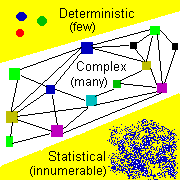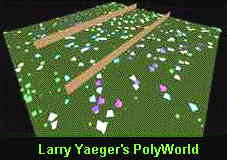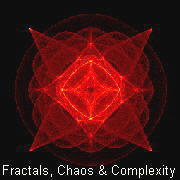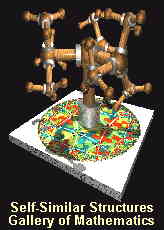Critically interacting components self-organize to form potentially evolving structures exhibiting a hierarchy of emergent system properties.
| Objectives | Our Scope | Complexity Overview | Site Overview | Navigation | Tour Guide |
"It is the best possible time to be alive,
when almost everything you thought you knew is wrong..."Tom Stoppard, Arcadia, 1993

The Complexity Theory idea covers many separate scientific research fields, nominally designated by such titles as ALife, Cellular Automata, Fractals, Genetic Algorithms, Neural Networks and Nonlinear Systems. The ideas used in these fields are complementary to each other and are all ways of approaching the study of those difficult areas involving many interconnected variables - complex systems. This site will relate and contrast all these approaches, and highlight their applications to both new areas of research and to long standing problems within conventional science and the humanities.
We provide a non-mathematical introduction for those who have not met any of these ideas before, we supply a more in-depth knowledge for those new to these fields and also offer a wider perspective for any visiting specialists. Comments from any party are welcomed.

Science normally considers simplified aspects of reality. A sub-set of properties (e.g. the movement of planets) is abstracted and mathematical formulae are developed and tested, to determine how well the property of interest can be modelled and predicted. Where this cannot easily be done the average of a collection of separate results is used instead to generate statistically valid models (e.g. birth rates per year by country). This has been a spectacularly successful enterprise since Newton's day, yet it has limitations. Many of the subjects that we wish to study are not amenable to simplification, they arise as a result of the complex nonlinear interactions between many different individual parts. Into this category come much of life and intelligent (human) behaviours. The field of Complexity Theory attempts to apply scientific methods to these complex systems, concentrating not on the entities (parts) but on the interactions, the dynamics of the system. Artificial Life attempts to apply these techniques to emulate biological processes, simulating the process of life and extracting the properties that are common to all possible life, and not just that based on our own Carbon metabolism. These fields also complement and extend earlier work in cybernetics, general systems theory, system dynamics, synergetics and dynamical systems theory. Close relations with artificial intelligence, process thought, fuzzy logic, evolutionary theory, general semantics, axiology and constructivism are also evident.
 In the humanities we try to both understand the creative impulse and to direct it in interesting ways. Here too complex system studies have a lot to offer. We can contrast the achievements so far seen in the arts with those theoretically possible, and gain insights into possible new directions and inherent limitations. We can evolve artforms in new ways, using the facilities of new technology and in this way give creative expression to those of us unskilled in conventional methods. Historically we can gain understanding of the dynamics of society and the ebb and flow of power within a framework
of changing stability and chaos. We are able to balance the opposing forces of destruction and creation and come to a new understanding of meaning and ethics within political and economic systems.
In the humanities we try to both understand the creative impulse and to direct it in interesting ways. Here too complex system studies have a lot to offer. We can contrast the achievements so far seen in the arts with those theoretically possible, and gain insights into possible new directions and inherent limitations. We can evolve artforms in new ways, using the facilities of new technology and in this way give creative expression to those of us unskilled in conventional methods. Historically we can gain understanding of the dynamics of society and the ebb and flow of power within a framework
of changing stability and chaos. We are able to balance the opposing forces of destruction and creation and come to a new understanding of meaning and ethics within political and economic systems.
The main scientific entry point for our site is our Introduction to Complex Systems intended for those completely new to these subjects. It leads on to more detailed material. A general introduction to our wider philosophical concept, and how Complexity Theory fits into this paradigm, is on our Concept page, and a overview of the CALResCo Group, our ideas and our work is available on the Information page. Introductions to various aspects of these fields can be accessed from the Themes page, with some pictorial results starting on the Images page. Our Art Exhibitions give an exciting alternative viewpoint from an artistic perspective and you can easily Search our entire site to locate material containing particular words of interest to you.
 The Links page connects to other sites dealing with these themes and for
access to extensive additional tutorial material and frequently asked questions we have the Tutorial page. A Glossary of Terms widely used in these fields is available. An important feature of our site is the Applications page, which shows how these ideas are used in practice and our Actions and Education pages where we show how to use these ideas to create a better world !
The Links page connects to other sites dealing with these themes and for
access to extensive additional tutorial material and frequently asked questions we have the Tutorial page. A Glossary of Terms widely used in these fields is available. An important feature of our site is the Applications page, which shows how these ideas are used in practice and our Actions and Education pages where we show how to use these ideas to create a better world !
For those requiring research information, we offer our Online Papers page which gives access to some of the best research material on the Web within these fields
and our Related Papers page which references applications and
similar work in other fields. Much research however is archived or in books and thus we provide our Offline Papers and Book Reviews pages to allow access to or information on the best of these resources. We also offer our own Research ideas and Essays...and even have some Software for you to play with at home. We have links to other Major Software available for download on the web and Java applets that may run in your browser.
Our FAQ on may be of interest and to catch up on the latest updates to our site we have our What's New page. We flag both New ![]() and Updated
and Updated ![]() (changed URL) entries on the relevant pages for your convenience (covering approximately the last 3 months), but sites do get moved by authors and we also flag links that we think are Dead
(changed URL) entries on the relevant pages for your convenience (covering approximately the last 3 months), but sites do get moved by authors and we also flag links that we think are Dead ![]() where we don't know their new location. We would much appreciate your information as to the current whereabouts of these important old links, if you are aware of their new addresses. Anyone particularly interested in these dead links can Mail me and I can supply my original copy of the HTML document by EMail attachment.
where we don't know their new location. We would much appreciate your information as to the current whereabouts of these important old links, if you are aware of their new addresses. Anyone particularly interested in these dead links can Mail me and I can supply my original copy of the HTML document by EMail attachment.
 All of the pages on the site have a number of navigation buttons at the top and bottom
of the page. Selecting any of these will take you directly to the indicated page. Additionally
the
All of the pages on the site have a number of navigation buttons at the top and bottom
of the page. Selecting any of these will take you directly to the indicated page. Additionally
the ![]() ,
, ![]() and
and ![]() buttons will allow you to navigate through our guided tour or exhibitions (see below). Most pages (including this one) have "Hot Links" (that look like that) that take you directly to the specified page or information (that one goes back up to 'Our Scope'), just click on these to select them. The
buttons will allow you to navigate through our guided tour or exhibitions (see below). Most pages (including this one) have "Hot Links" (that look like that) that take you directly to the specified page or information (that one goes back up to 'Our Scope'), just click on these to select them. The ![]() page gives direct access to all the 200+ pages currently available on this site. Our 'logo' panel on the Home page is also hot-wired to allow direct access to relevant links and applications on the indicated subjects and disciplines, plus selected pages and features.
page gives direct access to all the 200+ pages currently available on this site. Our 'logo' panel on the Home page is also hot-wired to allow direct access to relevant links and applications on the indicated subjects and disciplines, plus selected pages and features.
To make things easier our recommended tour is automated and explained fully on our
Enjoy, but if you don't like the site then do please drop us a note to say why, Feedback
so we can improve it !
 We occasionally present the 'CALResCo Select' award to what we regard as the very best sites, in terms of presentation and content. These are made available as Graphic Links which directly illustrate the relevant content, just click on the pictures to visit these recommended sites. Use whichever navigation method appeals to you.
We occasionally present the 'CALResCo Select' award to what we regard as the very best sites, in terms of presentation and content. These are made available as Graphic Links which directly illustrate the relevant content, just click on the pictures to visit these recommended sites. Use whichever navigation method appeals to you.
Tourguide
![]()
This page is the first port of call on the tour, so if you have already started just press
![]() to continue the tour...
to continue the tour...
![]()
![]()
![]()
![]()
![]()
![]()
![]()
![]()
![]()
![]()
![]()
![]()
![]()
![]()
![]()
![]()
![]()
![]()
![]()
![]()
![]()
![]()
![]()
![]()
![]()
![]()
Page Version 4.83 October 2004 (Original November 1997)